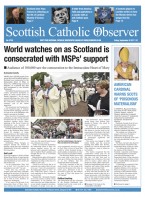April 28 | ![]() 0 COMMENTS
0 COMMENTS ![]() print
print

Escape from the madding crowd
NIALL GOOCH says that we should all be receptive to listening to the ‘still, small voice of calm’
‘GO placidly amid the noise and haste, and remember what peace there may be in silence.” That first line of the poem Desiderata, by Max Ehrmann, has always remained with me.
The rest will seem to many people a little trite, but that opening is a very helpful thing to keep in mind. Without silence—without reflection, contemplation, solitude—it is very hard to maintain any kind of serious inner life, and to truly think about things rather than merely react to them.
For Christians, that inner life is particularly important, in order that we are receptive to what one hymn writer called the ‘still, small voice of calm.’
In the Gospels, Jesus often seems keen to escape from the great crowds that came to see or hear Him. We are told that He would often ‘go off to some deserted place and pray’ (Luke 5v16). On the night that He was betrayed, before the Crucifixion, where do we find Him? In the garden of Gethsemane, at some distance even from the disciples, in solitary prayer.
Silence can be more easily desired than achieved, especially if we live or work in large cities. Last year I took my young son for a walk in the grounds of a stately home. The estate was beautiful—but the endless low roar of the motorway, which cut a brutal concrete swathe through the grounds a few hundred yards from the house, made it difficult to really settle into a peaceful frame of mind.
Then there is a slightly more thorny problem: how badly do we actually want quiet and contemplation?
The French philosopher Pascal famously said in his Pensees that ‘all the unhappiness of men arises from one single fact, that they cannot stay quietly in their own room.’
He develops this point by arguing that a great deal of human activity is a kind of displacement activity to avoid being alone with our thoughts, because to be so for any length of time can be extremely uncomfortable.
That sounds plausible to me, given than so many of us will have our secret troubles and weaknesses, our unfixable mistakes, our missed opportunities now forever lost, upon which to dwell. Interestingly, a scientific study published in 2014 appeared to support Pascal’s view, finding that many participants preferred to receive a small electric shock, or perform tedious activities, than sit silently without distractions in a room for just 20 minutes.
The ubiquity of screens and piped music in public spaces—even, as I discovered not long ago, the waiting areas of hospital maternity departments—certainly suggests some kind of generalised disquiet with the idea of simply leaving people to sit peacefully. I sometimes wonder whether the decline of Christian observance is a contributing factor to this fear of self-examination; people flee from it because they carry a burden of guilt from which they cannot see a way to be freed.
But equally, I see it in myself. If I have to wait for even a minute or two in the post office or supermarket, I find myself reaching for my smartphone, without even thinking about it.
Ah yes, the smartphone. Social media, Twitter in particular, creates extremely unhealthy dynamics. It immerses us constantly in an environment of novelty and immediacy, demanding that we react and respond, often with the only bare minimum of knowledge or context.
We seize upon those stories that massage our prejudices, without checking the background or the facts. With the illusion of instant expertise created by the internet, we opine confidently on matters which until a week ago had barely occupied our thoughts at all.
We seize quickly upon supposed villains, and place supposed heroes on pedestals. We neglect the maxim of the Roman Emperor Marcus Aurelius: “You are not compelled to form any opinion about this matter before you.”
The thing about Twitter is that it strips away the important context that helps us to understand people’s meaning and intentions.
If I debate with someone face to face I can see their body language, I can see their facial expression, I can gauge their tone of voice.
I have a much better chance of realising when something is being said tongue in cheek, or with a wry smile. I can judge whether someone is really committed to an idea or whether they are playing devil’s advocate.
Online we tend to encounter people not as persons, as whole rounded individuals, but as a bundle of political opinions, a representative of ‘The Left’ or of ‘Traditionalists.’
The nuances of individual worldviews are flattened, and we acquire the dangerous habit of instinctive disdain for our opponents.
Catholic social media circles have not escaped these dynamics, especially when it comes to controversies about the current papacy. Every day, it seems, we get some new gossip from Rome or some new reported remark by the Holy Father, and everyone rushes to fit it in to their pre-existing narratives. There seems to be little time for reflection or charity.
It is hardly an original observation that we live in the age of distraction. What might be a little less of a cliché is to wonder how the Christian tradition might help us to counter that constant distraction. What we need urgently, perhaps, is a ‘theology of the moment.’ What does this mean?
It means reaching back into the Christian tradition to find ways of strengthening our ability and willingness to step away from the demands and bad habits of a hyperconnected world of instant gratification. I am not thinking of ‘living in the moment,’ understood as a kind of glib hedonism.
Rather I am thinking of how we develop focus on the demands and duties of a particular moment, how we use our limited time well, how we serve others and God with our presence.
To give someone our full attention is an affirmation of their importance to us. My mother often quotes a saying she heard many years ago from a family psychologist, to the effect that ‘children spell ‘love’ as ‘T-I-M-E.’’
I am constantly reminding myself when playing with my son to ignore the allure of Twitter or Facebook or the latest breaking news and simply enjoy that particular occasion with him—an occasion which is unique and irreplaceable, and will soon be in the past. Even to try and capture it with a photo can feel like a step away from just cherishing the moment.
The battle can be won, however. Whether we look to the tradition of monastic contemplatives, like the Carthusians, or to the Ignatian spiritual exercises, or simply to lectio divina, there are many paths within the Catholic Faith to obey the ancient command from the Psalms: “Be still and know that I am God” (Ps 46v10).











